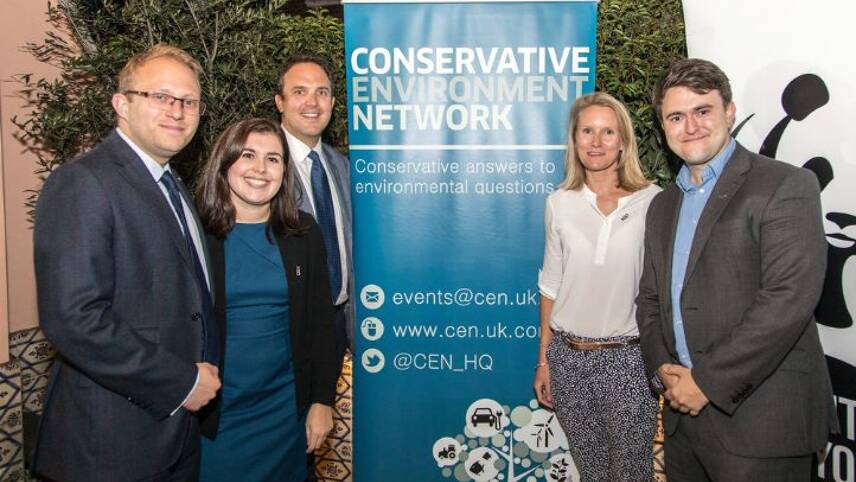Register for free and continue reading
Join our growing army of changemakers and get unlimited access to our premium content

The CEN has 41 members and is chaired by former Energy & Climate Intelligence Unit (ECIU) lead Sam Richards (right)
The Conservative Environment Network (CEN) set out a manifesto on Tuesday (2 July) that they said must govern the UK’s policies to prevent climate catastrophe and allow for greener economic growth. Among the 41 MPs who signed up to the pledges, which include a call for a new environment act, are senior figures such as Sir Nicholas Soames, Sir Oliver Letwin, Greg Hands, Caroline Spelman, Richard Benyon and Zac Goldsmith.
Both Tory leadership contenders, Boris Johnson and Jeremy Hunt, offered assurances that they supported the broad aims of giving government policy more environmental focus, but stopped short of explicitly endorsing all of the plans.
The initiative spanned the Brexit divide, with Brexiters such as Sir Bernard Jenkin, Michael Fabricant and Tracey Crouch enlisting alongside pro-Europeans including Sir Roger Gale, Soames and Spelman.
The principles include the net zero target on carbon emissions recently committed to by Theresa May, and the view that a “prosperous market economy” is the best way to achieve it – in contrast to the commitment by the Labour leader, Jeremy Corbyn, to renationalise key industries such as energy.
Support for onshore wind, though without subsidies, is among the pledges, despite the fact the government has put obstacles in the way of new onshore wind farms, leading to a sharp decline in renewable energy jobs.
There should also be investment in regional transport networks, the manifesto said, and a system of road pricing that would replace the current fuel duty. After Brexit, the common agricultural policy should be replaced by a system that “brings public and private money into a single market-based scheme for natural capital restoration”. It calls for the common fisheries policy to be replaced with properly enforced maximum sustainable yields for fish populations.
Greenpeace UK’s head of politics Rebecca Newsom said: “This manifesto contains many transformative policies that, taken together, would constitute a significant step towards addressing the climate and nature emergency.
“More than 40 Conservative MPs now back a fracking ban, a sevenfold increase in offshore wind by 2050, an earlier ban on new petrol and diesel cars and vans, fertiliser and pesticide taxes, high levels of protection for 30% of UK domestic waters, and more.
“There are some important gaps that still need to be closed, including policies to limit aviation demand and block further fossil fuel exploration, but this is a very positive and important step forward.”
Sam Richards, the director of the CEN, said: “[This] aims to present a set of ideas that, if adopted, offer the next Conservative prime minister an exciting opportunity to set the UK on a new path that could unite a divided country and secure the prosperity of future generations.”
In recent years the Conservative party has moved away from green policies such as subsidies for renewable energy, low-carbon homes standards and the flagship energy efficiency scheme, the Green Deal.
Environment Secretary Michael Gove who was not a signatory but spoke in favour of the manifesto at its launch, professed himself a “shy green Tory” and said there were many more in Conservative ranks. Seeking to reclaim the mantle of green concern as a Tory issue, he spoke of a love of the environment being core to the party’s beliefs. “That is at the heart of Conservatism,” he said.
“The principle that economic growth and respect for our planet are not two opposites [is a core principle],” he told a meeting in the House of Commons. “Just as it is irresponsible to build growth on debt, so we [must] use our resources profitably, which means the next generation does not have to clean up the mess that we have made.”
He spoke of the government’s work on marine conservation, green energy and natural protection, and the 25-year environment plan, which was nearly shelved by Theresa May before being revived last year, when it was met with caution by environmental groups.
Brexit would help the UK become more environmentally focused, rather than leading to the abandonment of environmental protections as many green groups have warned, Gove said. He cited fisheries as one example: “Leaving the EU gives us an opportunity to fundamentally change our support on marine protection.
“This [manifesto] needs to be a spur to even greater action,” he said, warning of temperature increases due to the climate crisis. Dismissing views that the environment was a niche issue, he said: “There is no crunchier issue than making sure we leave our environment in a better condition than we received it.”
Richards added: “We have a record to be proud of, as one of the leading countries tackling climate change. But we know there is more to do, and the manifesto aims to present a space to discuss these potential future pathways.”
Fiona Harvey
This article first appeared on the Guardian
edie is part of the Guardian Environment Network


But they ignore concrete manufacture as they push on with large commercial developments such as HS2 etc….more imports of LNG from the other side of the world rather than lower impact domestic supplies…who s fooling who?